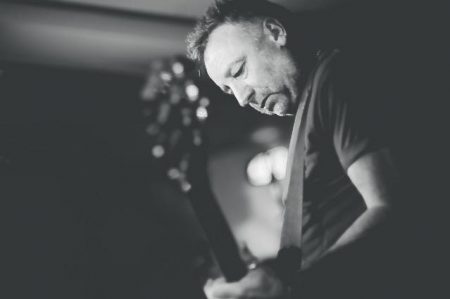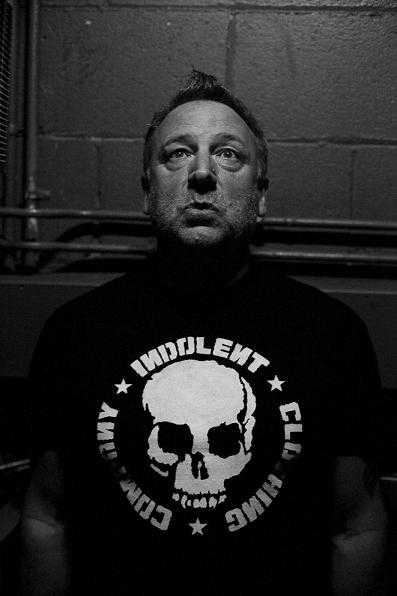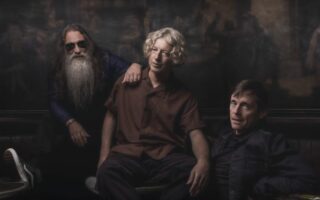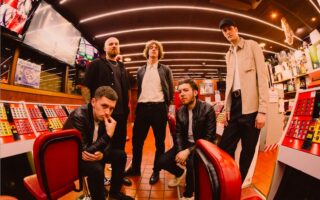Though with us for only a short time during the post punk years of the late Seventies and early Eighties, Joy Division‘s legend makes them one of Manchester’s most mythologised groups, as well as one of the cities most influential bands.
And though the story itself has been put to film several times and told by a number of people who were around at the time, no one from the group has ever taken the tale up themselves, until now.
Here, Peter Hook talks to Live4ever contributor Carl Stanley about why he felt the time was right for his new book Unknown Pleasures: Inside Joy Division and of all the memories his writing brought back.
Congratulations on the book, great read. Did the time feel right for you to do this?
The book was actually planned and started about two-and-a-half years ago, so it was just the way things fell. I didn’t know New Order were reforming; I found out like everyone did listening to the radio with Mark Radcliffe. So no, it wasn’t anything to do with New Order going out again, but I suppose in a funny way due to the antagonism between the parties I doubt a book, because of their attitude, will make it any better. I never had a chance to talk to them about it though and I have no contact with them, only through lawyers, so it wasn’t like, “I’m doing the book lads, what do you think, should this be in or what do you think of that?”.
The funny thing is, is that in 2006 when I came out of New Order I started wondering why we never did anything to celebrate Joy Division. In a way it did feel a bit like we just concentrated on New Order and put Joy Division in a box somewhere in the loft for all those years. So when I came out of New Order it was like going back into the loft and tidying it out. Plus, I’d already started celebrating the music because it was 30 years of Ian Curtis’ passing so the book felt natural, like the next thing.
On top of all that I’ve read so many books on Joy Division by people who weren’t there, and it’s always been something that’s slightly irked me, you could say, so in a way I thought it was time someone from the band told it, and with the Hacienda book being a success I was really happy to do it.
I’m guessing you had a lot more to take into consideration writing this book compared to ‘How Not To Run a Nightclub’. What were the hardest pieces of the story to write about?
The toughest part was seeing how hard we’d worked. When I started writing down all the dates of Ian getting married, having his baby, his suicide attempt, seeing it all down in black and white really knocked me back, you know? A young man who was in the worst of health having to cope with so much, and we were all just kids really. Though writing it all down and getting it out didn’t get rid of the guilt at all, or the pain. To be honest it just brought it back again. Realising we should have just not done this or played that gig, seeing the mistakes we made in simply not knocking certain things on the head, and if we had done that we might have all still been here today, and as big as ever. You never know though do you?
To be honest, I thought it might have been a harsher read in that respect – though you refer to you and Barney as a ‘pair of bastards’ a few times in there.
(Laughs) Yeah well I suppose with the current climate of things it could be a little bit odd to do that, but I’ve just gone out to be as honest and frank as I can be. I haven’t gone out of my way to slag anyone off, like I didn’t in the Hacienda book, though we’ve always argued! Bernard has said previously that he believes I stole the Hacienda from him which I honestly can’t see his justification for.
Writing things down comes over differently compared to telling the same story down the pub; you’ve got to show respect, but you’ve also got to bare in mind that this book will be on the shelf for a long time so you’ve got to be responsible. You don’t want it full of cheap shots and I think maybe the others thought I’d be taking a few regarding everything that’s happened.
To be honest, you probably criticise yourself more than anyone else in the book.
It’s just I didn’t want what I think is a petty argument getting in the way of history. I’m not going to spoil the Joy Division history just because me and Barney don’t see eye to eye over the band.
The start of the book sets the tone brilliantly – the gig when it all kicked off with your mates and the other punters. Why did you start it there?
That was an idea I got from when we did the Hacienda book. Ange Mathews – who used to run the Hacienda – helped me do that book and when we started it we were all asked to write up a day in the life of the Hac, a normal night at the Hacienda. Mine was the one that got picked so I did the same again and thought it started the book off great, catching the mood and showing how hard gigging can be.
My mates, though I love them to death, could be a pain in the arse, turning up off their heads, causing all sorts of trouble. The amount of times I used to come off stage and they’d be high as a kite with me asking, ‘Where’s all the stuff gone?’, you know, like they’re using you for the party. But they’re my mates and I love them. It was a good place to start the book as it was Joy Division’s first gig as well.
What I got pretty early on was that it was the music that kept you and Bernard together as the friendship you had, even at the very beginning of the band, seemed rather strained, like when you both went on that biking holiday in France.
Well you know what they say: ‘You don’t know anyone until you’ve been on holiday with them’, and that’s what happened. I was always part of the gang, but Bernard’s always been quite solitary and basically what I saw on that holiday was his attitude – what you’d call selfish, which is the worst way of putting it but I’ve just never been like that. What you do learn is that you can work with someone and make wonderful music, change the world, have a company that changed the world like the Hacienda and Factory did, but as friends it’s different.
People always say ‘don’t mix work and pleasure’ and when it comes down to it it’s true. You don’t have to love your work mates. But as you get older you realise that everyone is entitled to their own opinion and space that there comfortable with. and if you don’t agree with it you don’t have to fall out. I mean it was a really sad moment because we’d been so close before.
It’s always easy to think that most groups are all ‘great mates’, living together like The Monkees did on TV.
Yeah, well actually a lot of people do think that and that’s the funny thing with New Order now that when ever you read anything about the band it’s always, ‘They’re such a great bunch and having such a great time without Hooky, thank God they got rid of him’. But anybody with half a brain must read it and go, ‘F*ck off !’, it’s like they’re over compensating but, you know, you can read between the lines.
You also mention what you imagined viewers thought of Ian’s energetic performance during ‘Transmission’ on Tony Wilson’s show ‘Something Else’. Bernard’s former bandmate in Electronic, drummer Chris Goodwin, said as a kid watching it with his family his Dad commented: ‘…him dancing there, he’s as high as a bloody kite him’, but it left Chris totally thrilled. What other events of Joy Division’s career stand-out to you?
It’s wonderful to hear things like that. In the book I talk about when we played ‘Transmission’ at the Mayflower and all the other bands stopped what they were doing, gathered round and watched us. But it’s like when you’re writing a great article and you’re thinking, ‘It’s all right that, yeah pretty good’ but you know it’s for other people to say how great it is, and that’s what the Mayflower gig felt like.
You write it and hope people appreciate it, and we were writing music that people were really getting into and knocking their socks off with it, so when people talk about it like Chris saying that it really is quite humbling, even now. But it’s all about chemistry and that’s what Joy Division was about; the music was written by three of us, and Ian was a fantastic frontman and wonderful lyricist. Where Bernard and I pretended to be frontmen but we aren’t really, Ian was definitely a frontman like Ian Brown’s a front man, like Mick Jagger’s a frontman. Though he had three great musicians to back him up, and like I said in the book, I don’t think any of us – me Bernard or Steve – would ever find that chemistry we had in Joy Division again. Saying that, what we did with New Order was a fantastic achievement as well, to do it with one band is great but to do it twice…
One thing that stands out is Ian had many sides to him, which you would say is the root to the many different descriptions of him around that time. To the band he was one of the lads, but he was also seen as quite ‘arty’, as well as a family man. I felt the book explained this all quite well.
Well I think the thing there is Ian was under a lot of pressure from different circumstances, and you know yourself when you go to your parents’ house you tend to act different to when you’re with your mates. But with Ian he’s been sort of canonised through the years, like people look at him with that saintly look and I think we’ve all been a bit guilty of that. The problem with Ian was he wouldn’t give into his illness because he didn’t want to let us down. The thing we most wanted to hear was that he was all right, so when we would ask him he’d just say, ‘Yeah mate I’m fine, shut up moaning and get on with it will you’ and we’d be like, ‘Thank f*ck for that’. Like I said, we were real young and just wanted to get on with it and no one more than Ian. 23 years old he was when he went which is really young, we started when we were around 20 and when Ian died I was just turning 23.
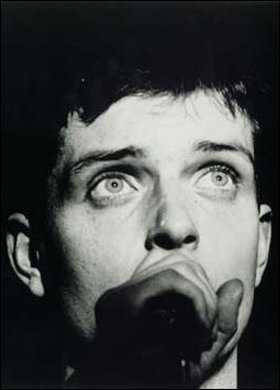 Ian went through so much in such a short space of time didn’t he?
Ian went through so much in such a short space of time didn’t he?
Very much so, and to think Joy Division were only professional for about six months, the impact the band made musically and culturally is quite unbelievable. A fantastic achievement – when Unknown Pleasures came out we were all still working. I was working at the docks, Bernard was at Cosgrove Hall, Steve was working for his Dad and Ian was at the employment exchange. We had a seminal album out but we were all out working still.
A lighter side in the book is your affection for Coronation Street and how you remember it growing up. I could actually imagine you as the new owner of Mike Baldwin’s knicker factory; the flash middle-aged geezer with money, breaking hearts on the street. Would you ever like to do a bit of acting on Coronation Street?
It’s wonderfully flattering to be thought of as a cultural icon on Coronation Street – and funny because I know a lot of the Coronation Street lot, and in the old days I used to see them out in the clubs off their tits, but now I see them running 10ks (laughs) which shows you how times change. I remember as a kid sitting at the top of the stairs hearing the music come on, so I always knew when it was half-seven, and I’ve never stopped. Even now I still watch it, it’s a ritual. Like I read every page of the Manchester Evening News still, cover to cover, just as I did as a youngster. It’s a habit I suppose.
You’ve got a book signing tour coming up haven’t you? Can it get a bit heavy though with Joy Division and New Order fans asking awkward questions in the Q&’s, with the way things are between you and the band?
I’m thinking I’ll probably get a few awkward questions from the people in the book! You watch I’ll turn up and Bernard will be stood there in the que to get his book signed and to ask a few questions so I’ll need a minder as well (laughs).
You’re quite good at this book writing lark, what’s next?
Thanks. Well I’m going to do a book on New Order because I think that story needs telling as well, and after that I don’t know. I’ll probably start the New Order one next year, but that’ll take me about two years to put together – by then I’ll be 6o.
After that I’m not sure – get a job at B&Q or something.
Peter Hook’s book tour began in Manchester yesterday (October 1st) and will visit Bristol, Birmingham, Liverpool, Dublin, Glasgow, Edinburgh, with special events also booked in Ilkley, Morley, Preston, Chester and Sheffield. The full details on these, and Peter’s November tour dates with The Light, can be found at peterhook.co.uk.
Check out Live4ever’s review of the book here.


